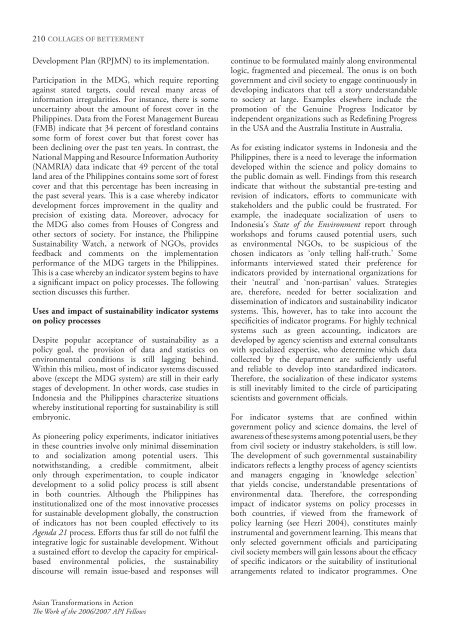Asian Transformations in Action - Api-fellowships.org
Asian Transformations in Action - Api-fellowships.org
Asian Transformations in Action - Api-fellowships.org
Create successful ePaper yourself
Turn your PDF publications into a flip-book with our unique Google optimized e-Paper software.
210 COLLAGES OF BETTERMENTDevelopment Plan (RPJMN) to its implementation.Participation <strong>in</strong> the MDG, which require report<strong>in</strong>gaga<strong>in</strong>st stated targets, could reveal many areas of<strong>in</strong>formation irregularities. For <strong>in</strong>stance, there is someuncerta<strong>in</strong>ty about the amount of forest cover <strong>in</strong> thePhilipp<strong>in</strong>es. Data from the Forest Management Bureau(FMB) <strong>in</strong>dicate that 34 percent of forestland conta<strong>in</strong>ssome form of forest cover but that forest cover hasbeen decl<strong>in</strong><strong>in</strong>g over the past ten years. In contrast, theNational Mapp<strong>in</strong>g and Resource Information Authority(NAMRIA) data <strong>in</strong>dicate that 49 percent of the totalland area of the Philipp<strong>in</strong>es conta<strong>in</strong>s some sort of forestcover and that this percentage has been <strong>in</strong>creas<strong>in</strong>g <strong>in</strong>the past several years. This is a case whereby <strong>in</strong>dicatordevelopment forces improvement <strong>in</strong> the quality andprecision of exist<strong>in</strong>g data. Moreover, advocacy forthe MDG also comes from Houses of Congress andother sectors of society. For <strong>in</strong>stance, the Philipp<strong>in</strong>eSusta<strong>in</strong>ability Watch, a network of NGOs, providesfeedback and comments on the implementationperformance of the MDG targets <strong>in</strong> the Philipp<strong>in</strong>es.This is a case whereby an <strong>in</strong>dicator system beg<strong>in</strong>s to havea significant impact on policy processes. The follow<strong>in</strong>gsection discusses this further.Uses and impact of susta<strong>in</strong>ability <strong>in</strong>dicator systemson policy processesDespite popular acceptance of susta<strong>in</strong>ability as apolicy goal, the provision of data and statistics onenvironmental conditions is still lagg<strong>in</strong>g beh<strong>in</strong>d.With<strong>in</strong> this milieu, most of <strong>in</strong>dicator systems discussedabove (except the MDG system) are still <strong>in</strong> their earlystages of development. In other words, case studies <strong>in</strong>Indonesia and the Philipp<strong>in</strong>es characterize situationswhereby <strong>in</strong>stitutional report<strong>in</strong>g for susta<strong>in</strong>ability is stillembryonic.As pioneer<strong>in</strong>g policy experiments, <strong>in</strong>dicator <strong>in</strong>itiatives<strong>in</strong> these countries <strong>in</strong>volve only m<strong>in</strong>imal dissem<strong>in</strong>ationto and socialization among potential users. Thisnotwithstand<strong>in</strong>g, a credible commitment, albeitonly through experimentation, to couple <strong>in</strong>dicatordevelopment to a solid policy process is still absent<strong>in</strong> both countries. Although the Philipp<strong>in</strong>es has<strong>in</strong>stitutionalized one of the most <strong>in</strong>novative processesfor susta<strong>in</strong>able development globally, the constructionof <strong>in</strong>dicators has not been coupled effectively to itsAgenda 21 process. Efforts thus far still do not fulfil the<strong>in</strong>tegrative logic for susta<strong>in</strong>able development. Withouta susta<strong>in</strong>ed effort to develop the capacity for empiricalbasedenvironmental policies, the susta<strong>in</strong>abilitydiscourse will rema<strong>in</strong> issue-based and responses willcont<strong>in</strong>ue to be formulated ma<strong>in</strong>ly along environmentallogic, fragmented and piecemeal. The onus is on bothgovernment and civil society to engage cont<strong>in</strong>uously <strong>in</strong>develop<strong>in</strong>g <strong>in</strong>dicators that tell a story understandableto society at large. Examples elsewhere <strong>in</strong>clude thepromotion of the Genu<strong>in</strong>e Progress Indicator by<strong>in</strong>dependent <strong>org</strong>anizations such as Redef<strong>in</strong><strong>in</strong>g Progress<strong>in</strong> the USA and the Australia Institute <strong>in</strong> Australia.As for exist<strong>in</strong>g <strong>in</strong>dicator systems <strong>in</strong> Indonesia and thePhilipp<strong>in</strong>es, there is a need to leverage the <strong>in</strong>formationdeveloped with<strong>in</strong> the science and policy doma<strong>in</strong>s tothe public doma<strong>in</strong> as well. F<strong>in</strong>d<strong>in</strong>gs from this research<strong>in</strong>dicate that without the substantial pre-test<strong>in</strong>g andrevision of <strong>in</strong>dicators, efforts to communicate withstakeholders and the public could be frustrated. Forexample, the <strong>in</strong>adequate socialization of users toIndonesia’s State of the Environment report throughworkshops and forums caused potential users, suchas environmental NGOs, to be suspicious of thechosen <strong>in</strong>dicators as ‘only tell<strong>in</strong>g half-truth.’ Some<strong>in</strong>formants <strong>in</strong>terviewed stated their preference for<strong>in</strong>dicators provided by <strong>in</strong>ternational <strong>org</strong>anizations fortheir ‘neutral’ and ‘non-partisan’ values. Strategiesare, therefore, needed for better socialization anddissem<strong>in</strong>ation of <strong>in</strong>dicators and susta<strong>in</strong>ability <strong>in</strong>dicatorsystems. This, however, has to take <strong>in</strong>to account thespecificities of <strong>in</strong>dicator programs. For highly technicalsystems such as green account<strong>in</strong>g, <strong>in</strong>dicators aredeveloped by agency scientists and external consultantswith specialized expertise, who determ<strong>in</strong>e which datacollected by the department are sufficiently usefuland reliable to develop <strong>in</strong>to standardized <strong>in</strong>dicators.Therefore, the socialization of these <strong>in</strong>dicator systemsis still <strong>in</strong>evitably limited to the circle of participat<strong>in</strong>gscientists and government officials.For <strong>in</strong>dicator systems that are conf<strong>in</strong>ed with<strong>in</strong>government policy and science doma<strong>in</strong>s, the level ofawareness of these systems among potential users, be theyfrom civil society or <strong>in</strong>dustry stakeholders, is still low.The development of such governmental susta<strong>in</strong>ability<strong>in</strong>dicators reflects a lengthy process of agency scientistsand managers engag<strong>in</strong>g <strong>in</strong> ‘knowledge selection’that yields concise, understandable presentations ofenvironmental data. Therefore, the correspond<strong>in</strong>gimpact of <strong>in</strong>dicator systems on policy processes <strong>in</strong>both countries, if viewed from the framework ofpolicy learn<strong>in</strong>g (see Hezri 2004), constitutes ma<strong>in</strong>ly<strong>in</strong>strumental and government learn<strong>in</strong>g. This means thatonly selected government officials and participat<strong>in</strong>gcivil society members will ga<strong>in</strong> lessons about the efficacyof specific <strong>in</strong>dicators or the suitability of <strong>in</strong>stitutionalarrangements related to <strong>in</strong>dicator programmes. One<strong>Asian</strong> <strong>Transformations</strong> <strong>in</strong> <strong>Action</strong>The Work of the 2006/2007 API Fellows
















